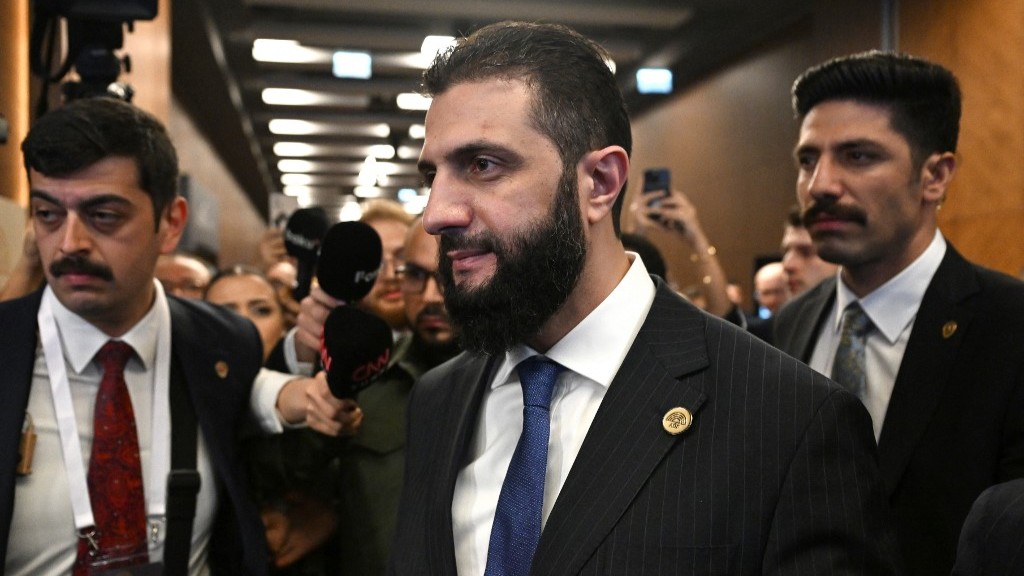UK lifts sanctions on Syrian ministries and intelligence agencies

The UK has lifted sanctions on Syria's defence and interior ministries and a range of its intelligence agencies in a major move towards normalising ties with the country's new government.
On Thursday morning, the UK Treasury published a notice revealing it has lifted asset freezes on Syria's General Intelligence Directorate, Air Force Intelligence Agency and Political Security Directorate, as well as its defence and interior ministries.
This is despite the Syrian government being led by figures that were part of Hay’at Tahrir al-Sham (HTS), the armed group that toppled Bashar al-Assad's government and remains a proscribed terrorist organisation in the UK, as well as in the US.
Ahmed al-Sharaa, Syria's new president, has urged Britain and other countries to lift all the sanctions that had been imposed on the country under Assad.
“The sanctions were implemented as a response to crimes committed by the previous regime against the people,” he told the New York Times in an interview published on Wednesday.
New MEE newsletter: Jerusalem Dispatch
Sign up to get the latest insights and analysis on Israel-Palestine, alongside Turkey Unpacked and other MEE newsletters
In March, the UK lifted sanctions on 24 Syrian entities, including state-owned oil companies and the state airline, becoming the first country to unfreeze all assets of the Central Bank of Syria.
Britain's move marks a significant policy shift but is unlikely to have a major material impact without the United States following suit.
'Without the US making serious changes it may not amount to a massive change'
- Chris Doyle, Council for Arab-British Understanding
Chris Doyle, chair of the Council for Arab-British Understanding, told Middle East Eye: "It is welcome to see sanctions being eased, but without the US making serious changes it may not amount to a massive change. The key will be when the US lifts banking sanctions and money transfers to Syria can be made."
Earlier this year the US waived a ban on transactions with the Syrian government, facilitating humanitarian aid. But it has kept sanctions in place, making them contingent on a series of reforms.
On 18 March, a US official handed Syria’s foreign minister eight demands during a conference in Brussels.
The US reportedly demanded that Syria’s interim administration publicly ban all Palestinian armed and political activities and deport members of Palestinian armed groups to "ease Israeli concerns".
Other demands included allowing US counterterrorism operations inside Syria, designating Iran’s Islamic Revolutionary Guard Corps as a terrorist organisation and forming a unified Syrian army with no foreign fighters in key command roles.
PIJ officials arrested
The Syrian government appears to be taking steps to appease US demands. Authorities arrested two senior Palestinian Islamic Jihad (PIJ) leaders last week.
PIJ's armed wing, the al-Quds Brigades, said on Tuesday that the arrests occurred “without any explanation” and in “a manner we would not have hoped to see from our brothers, whose land has always been a haven for loyal and free people”.
PIJ has long held a presence in Syria. The group has been the target of Israeli air strikes in recent months, including a 14 November attack on the suburbs of Damascus that killed 15 people, including several PIJ members.
Since the fall of Assad, the Israeli army has carried out regular air raids and ground incursions into Syria, sometimes wounding and killing residents in the south.
Israeli officials have called for a demilitarisation of southern Syria and claimed the new authorities are a threat to the Druze minority.
But many Syrians across the country, including Druze in the south, have firmly rejected Israel’s statements and military actions.
In early March, a wave of attacks against the country's Alawite minority saw hundreds killed by armed militias, in what appeared to be revenge killings against people accused of being loyal to Assad.
middleeasteye.net